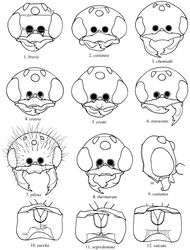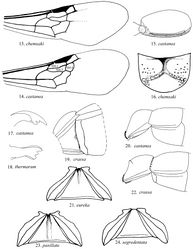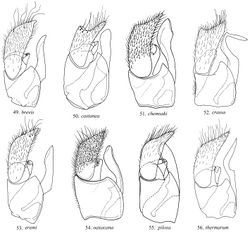Colocistis
| Notice: | This page is derived from the original publication listed below, whose author(s) should always be credited. Further contributors may edit and improve the content of this page and, consequently, need to be credited as well (see page history). Any assessment of factual correctness requires a careful review of the original article as well as of subsequent contributions.
If you are uncertain whether your planned contribution is correct or not, we suggest that you use the associated discussion page instead of editing the page directly. This page should be cited as follows (rationale):
Citation formats to copy and paste
BibTeX: @article{Kimsey2013JournalofHymenopteraResearch33, RIS/ Endnote: TY - JOUR Wikipedia/ Citizendium: <ref name="Kimsey2013Journal of Hymenoptera Research33">{{Citation See also the citation download page at the journal. |
Ordo: Hymenoptera
Familia: Tiphiidae
Name
Colocistis Krombein – Wikispecies link – Pensoft Profile
- Colocistis Krombein, 1942 (April):65. Type species: Colocistis pilosa Krombein 1942[1]:66. Original designation.
- Aglyptacros Mickel & Krombein, 1942 (November):669. Type species: Glyptometopa eureka Banks 1912[2]. Original designation. Synonymized by Kimsey 2006[3].
Diagnosis
The genus Colocistis exhibits a number of unique traits in both sexes. Features in the female, include the ventrally angulate occipital carina, the ventrally angulate mid- and hindtrochanters, hindcoxal carina on both the inner, ventral margin and dorsobasal surface. Because a number of these features, including the angulate occipital carina and hindcoxal carina are shared with males of Colocistis and the distributions of the two genera coincide Aglyptacros was made the junior synonym of Colocistis (Kimsey 2006[3]).
Description
Male Body length 5–16 mm.
Head. Compound eyes and ocelli enlarged (except quite small in Colocistis chemsaki and Colocistis pilosa); gular carina either not elevated or elevated gradually at level of posterior mandibular condyle, not suddenly produced apically, clypeal length versus width ratio not exceeding 0.35; maxillary and labial palpi not reduced, maxillary palpi six-segmented, exceeding posterior border of gular orifice by half length of palpus; labial palpi four-segmented.
Mesosoma. Fore wing with costa extending beyond stigma for a distance not over half length of stigma; forewing with two discoidal cells and two or three submarginal cells, second submarginal cell completely or almost completely underlying first submarginal cell, first transverse cubital vein arising at or before basal third of second submarginal cell (Fig. 14); hind wing with cubitus arcuately curved, longer that first transverse cubital vein and meeting it at an angle of less than 135 degrees; hind wing with jugal lobe shorter than submedial cell; forecoxa with admesal stridulatory area; hindcoxa with longitudinal carina on inner margin.
Metasoma. Sternum II without basal longitudinal carina (one species with transverse carina); digitus of genitalia without process extending distad of articulum; volsellar plate without spines or teeth, but with flexible hairs on mesal surface.
Description
Female Body length 5–12 mm.
Head. Mandible broadest subapically, with two distinct apical teeth, inner margin with large, obtuse tooth at broadest point, obtuse tooth obscured by scutate bristles, inner margin below tooth with three small teeth, outer carina obsolescent, ventral carina distinct, sharp; maxillary palp 5-segmented; occipital carina well-developed, angulate ventrolaterally, forming straight line ventrally, often subtended by secondary carina; vertex with submedial impressions, lateral setose groove represented by row of large punctures or foveae.
Mesosoma. Propleural ventral margin strongly elevated, with sharp, transverse carina; hindcoxa with longitudinal carina on inner margin; hindtibial calcar slightly curved and acute apically.
Metasoma. Sternum I with transverse subbasal carina well-developed and protruding, subtended by medial pit, and with two foveae basad; tergum I with well-developed lateral ridge.
Distribution
Colocistis species are found in southeastern California, southern Nevada, southern Arizona, southern Colorado, western Texas and as far south as Oaxaca, Mexico.
Key to species of Colocistis
Taxon Treatment
- Kimsey, L; Wasbauer, M; 2013: Revision of the brachycistidine genus Colocistis Krombein, 1942 (Hymenoptera, Tiphiidae) Journal of Hymenoptera Research, 33: 1-24. doi
Other References
- ↑ Krombein K (1942) A new genus and species of Brachycistidinae. Proceedings of theEntomological Society of Washington 44: 67-68. doi: 10.2307/2420897
- ↑ Banks N (1912) New Scolioidea. The Canadian Entomologist 44: 197-203. doi: 10.4039/Ent44197-7
- ↑ 3.0 3.1 Kimsey L (2006) Competing taxonomies: reexamination of the female-based genera of Brachycistidinae (Hymenoptera: Tiphiidae). Zootaxa 1121: 21-34.
Images
|


